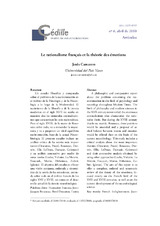Le rationalisme français et la théorie des émotions
Autor
Camarero, Jesús
Editor
UCOPressFecha
2010Materia
Ilustración francesaRousseau, Jean-Jacques, 1712-1778
Descartes, René
Teoría de las emociones
Neurobiología
French enlightenment
Theory of the emotions
Neurobiology
METS:
Mostrar el registro METSPREMIS:
Mostrar el registro PREMISMetadatos
Mostrar el registro completo del ítemResumen
Un estudio filosófico y comparado sobre el problema de la razón/emoción en el ámbito de la Psicología y de la Neurología a lo largo de la Modernidad. El nacimiento de la filosofía y de la ciencia modernas en el siglo XVII no oculta en nuestros días las tremendas contradicciones que caracterizan las tesis racionalistas. Pero el siglo XVIII, de la mano de Rousseau sobre todo, va a enmendar la trayectoria y va a proponer un ideal equilibrio razón-emoción, base de la actual Neurobiología. El presente estudio incluye un análisis crítico de las teorías más importantes (Descartes, Pascal, Rousseau, Darwin, Ellis, LeDoux, Damasio, Goleman) y su análisis contrastivo por medio de otras teorías (Locke, Voltaire, La Mettrie, Foucault, Marías, Habermas, Zubiri, Iglesias). El objetivo del estudio es ofrecer una visión conjunta, ordenada y sistemática de la teoría de las emociones, centrada sobre todo en el ámbito francés de los siglos XVII y XVIII, así como en el desarrollo actual de la ciencia neurobiológica. A philosophic and comparative report about the problem concerning the reason/ emotion in the field of psychology and neurology throughout Modern Times. The birth of philosophy and modern sciences in the XVII century never veiled the enormous contradictions that characterize the rationalist thesis. But during the XVIII century thanks to, mainly, Rousseau, these positions would be amended and a proposal of an ideal balance between reason and emotion would be offered then on the basis of the current neurobiology. This study includes a critical analysis about the most important theories (Descartes, Pascal, Rousseau, Darwin, Ellis, LeDoux, Damasio, Goleman) and their contrastive analysis obtained by using other approaches (Locke, Voltaire, La Mettrie, Foucault, Marías, Habermas, Zubiri, Iglesias). The aim of this report is to offer a complete, ordered and systematic review of the theory of the emotions, focused mostly on the French field of the XVII and XVIII centuries, as well as on the current development of the neurobiological science.

